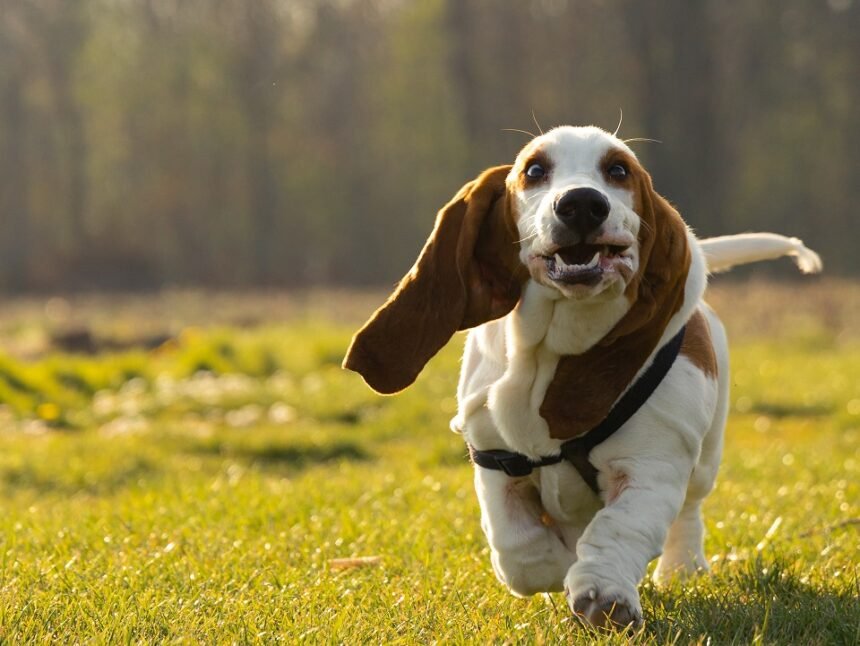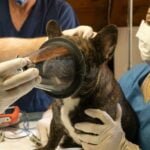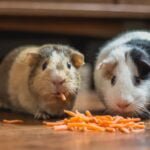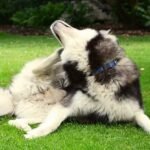The Basset Hound is a distinctive and charming breed known for its long, droopy ears, soulful eyes, and a wrinkled face. Originating in France, Basset Hounds are scent hounds that were bred for hunting small game such as rabbits. They are medium to large-sized dogs with a sturdy build and a low-slung body. Basset Hounds have a friendly and laid-back nature, making them excellent companions for individuals and families alike. They have a keen sense of smell and a unique, melodious howl that adds to their unique charm.
Physical Characteristics and Appearance:
Basset Hounds have a distinct appearance with their long, pendulous ears, loose skin, and droopy eyes. They have a compact and muscular body, with short legs and a deep chest. Their coat is short, dense, and comes in various colors, including tri-color (black, white, and brown) and lemon and white. Basset Hounds have a calm and amiable expression, which reflects their gentle and good-natured temperament.
Temperament and Personality Traits:
Basset Hounds are known for their friendly and easygoing nature. They are typically mild-mannered, patient, and affectionate dogs that enjoy the company of their human family. They are generally good with children and can be a great addition to a family household. Basset Hounds are social animals and usually get along well with other dogs and pets. However, they can have a stubborn streak, which may require patience and consistent training.
Basset Hound’s History and Origins:
The Basset Hound’s rich history dates back to 6th-century France, where people bred them for hunting small game, particularly rabbits, because of their exceptional sense of smell and endurance. The breed’s name, “Basset,” derives from the French word “bas,” which means low, and it refers to their short legs and low-to-the-ground stature. In England and later in the United States, Basset Hounds gained popularity and earned recognition as a distinct breed.
Exercise and Activity Requirements:
Despite their relaxed demeanor, Basset Hounds still require regular exercise to maintain their overall health and prevent obesity. They have moderate exercise needs and enjoy daily walks, sniffing and exploring their surroundings. However, it’s important to avoid excessive exercise or strenuous activities due to their short legs and long backs, which can make them prone to joint issues.
Grooming and Care Needs:
Basset Hounds have a short and dense coat that is relatively low-maintenance. They shed moderately, requiring regular brushing to remove loose hair and keep their coat in good condition. Their droopy ears should be checked regularly and kept clean to prevent infections. Additionally, Basset Hounds have a tendency to drool, so regular wiping of the face and mouth may be necessary.
Health Issues and Common Concerns:
Basset Hounds are generally healthy dogs, but they are prone to certain breed-specific health issues. These may include ear infections, obesity, hip dysplasia, elbow dysplasia, intervertebral disc disease, and bloat. Regular veterinary check-ups, a balanced diet, proper exercise, and weight management can help mitigate these risks and ensure the overall well-being of the Basset Hound.
Training and Obedience:
Basset Hounds can be a bit stubborn and independent, making training a challenge at times. They have a tendency to follow their noses and can be easily distracted. Positive reinforcement methods, such as treats, praise, and consistency, work best when training Basset Hounds. Early socialization and obedience training are essential to help them become well-rounded and well-behaved companions.
Basset Hound as a Family Pet:
Basset Hounds make excellent family pets due to their friendly and patient nature. They are known for their love and affection towards their human family members, including children. Basset Hounds are generally tolerant and gentle, making them a suitable choice for families with young kids. However, it’s important to supervise interactions between children and dogs to ensure both parties are safe and comfortable.
Basset Hound’s Compatibility with Other Pets:
Basset Hounds typically have a good temperament and get along well with other dogs and pets. They have a friendly and non-aggressive nature, which helps them to coexist harmoniously with other animals in the household. Proper introductions and early socialization are important to foster positive relationships between a Basset Hound and other pets.
Basset Hound’s Lifespan and Aging Process:
On average, Basset Hounds have a lifespan of 10 to 12 years. However, with proper care and attention to their health, some Basset Hounds can live even longer. As they age, Basset Hounds may experience certain age-related issues, such as joint problems, arthritis, and weight gain. Regular vet check-ups, a balanced diet, appropriate exercise, and monitoring their overall well-being can help ensure a healthy and comfortable aging process for Basset Hounds.
Frequently Asked Questions about Basset Hounds:
1. Are Basset Hounds good with children?
Yes, Basset Hounds are generally good with children. They have a patient and tolerant nature, making them suitable companions for kids. However, supervision is still necessary to ensure safe and respectful interactions.
2. Do Basset Hounds require a lot of exercise?
Basset Hounds have moderate exercise needs. Daily walks and some playtime are usually sufficient to meet their exercise requirements. However, they should not be overexerted or engaged in strenuous activities due to their physical build.
3. Are Basset Hounds easy to train?
Basset Hounds can be a bit stubborn and independent, which can make training challenging. However, with positive reinforcement, patience, and consistency, they can be trained successfully. Early socialization and obedience training are important for their development.
4. Do Basset Hounds drool a lot?
Yes, Basset Hounds have a tendency to drool, especially after eating or drinking. Regular wiping of the face and mouth can help manage the drooling.
5. Are Basset Hounds prone to health issues?
Basset Hounds are prone to certain breed-specific health issues, including ear infections, obesity, hip dysplasia, and intervertebral disc disease. Regular veterinary care and a healthy lifestyle can help minimize the risks.







